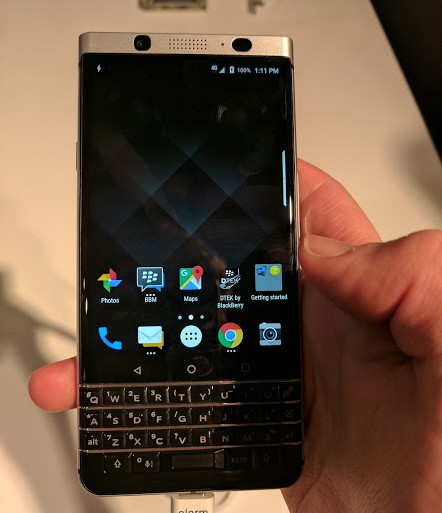BlackBerry is back with its final smartphone, the QWERTY keyboard-toting, business-focussed BlackBerry KeyOne, previously codenamed Mercury.
Launched in the run-up to Mobile World Congress (MWC) 2017 in Barcelona, the KeyOne was designed by BlackBerry but made by TCL Communications, which will take over the design and creation of future BlackBerry branded handsets.
BlackBerry KeyOne
![]() Sporting a 4.5inch display with a resolution of 1620×1080, a Snapdragon 625 system-on-a-chip, a 3,505mAh battery, 12 megapixel rear camera and an eight megapixel one to the front, the KeyOne does not initially dazzle the smartphone market with its specifications.
Sporting a 4.5inch display with a resolution of 1620×1080, a Snapdragon 625 system-on-a-chip, a 3,505mAh battery, 12 megapixel rear camera and an eight megapixel one to the front, the KeyOne does not initially dazzle the smartphone market with its specifications.
But the standout feature is the phone’s QWERTY keyboard, something that both appealed and repulsed punters with the BlackBerry Priv, with the aim of making hacking out emails on the go far easier than the more haphazard process of tapping on a smartphone for some users.
On the software side, the KeyOne has Google’s Android 7.1 Nougat at its core but is heavily customised with BlackBerry’s user interface and apps. BlackBerry Messenger, Hub, and the privacy and security management DTEK app are all present and correct.
The combination of a specification that will not drain battery life in order to deliver blistering mobile compute power, and a suite of work-focussed apps, indicates the KeyOne is very much all business, and both BlackBerry and TCL will not doubt be hoping it attracts enterprise users away from the Apple’s iPhones and Samsung’s Galaxy handsets.
With a starting price of £499, the KeyOne is not too expensive, but there are certainly cheaper smartphones on the market.
With it due to go on sale in April, time will shortly tell if there still life in BlackBerry hardware or if the Canadian company’s brand will be more associated with its secure communications software from now on.
Silicon hands-on first impression
![]() BlackBerry’s KeyOne is an odd phone to handle; it feels both large, due to the QWERY keyboard, and small at the same time, thanks to a display that’s distinctly small for a device of its proportions. in the hand the metal frame feels solid, but the overall design of the phone is certainly not going to win any prizes at a tech beauty contest.
BlackBerry’s KeyOne is an odd phone to handle; it feels both large, due to the QWERY keyboard, and small at the same time, thanks to a display that’s distinctly small for a device of its proportions. in the hand the metal frame feels solid, but the overall design of the phone is certainly not going to win any prizes at a tech beauty contest.
While not exactly heavy on display or processor tech, from our brief hand-on the KeyOne is faily smooth and slick to use, with BlackBerry’s user interface easy to navigate, with it leaving Android Nougats best features untouched. It doesn’t feel as blisteringly fast as some high-end smartphones, but is is no slouch either.
At only 4.5inches, the Full HD display is fairly clear, despite having a resolution half that of many flagship Android devices; it doesn’t exactly impress but it leaves not a whole lot to be desired either. We’d need more time with the phone to really get to grips with its interface and see if the smaller display is a problem to productivity.
![]() The QWERTY keyboard is obviously the KeyOne’s party piece and here’s where it all gets a little odd. For two handed use the keyboard is fine in practice, even if to some hands the keys may be a little small. It’s a little spongy but still fairly accurate. In one hand the whole thing feels clumsy; sure using any large phone in one hand to write a message feels awkward, but trying to physical press each key while gripping the KeyOne feels like it’s going to slip out of your grasp.
The QWERTY keyboard is obviously the KeyOne’s party piece and here’s where it all gets a little odd. For two handed use the keyboard is fine in practice, even if to some hands the keys may be a little small. It’s a little spongy but still fairly accurate. In one hand the whole thing feels clumsy; sure using any large phone in one hand to write a message feels awkward, but trying to physical press each key while gripping the KeyOne feels like it’s going to slip out of your grasp.
The keyboard is touch enabled but we’d need more time with it to get a good impression of its capabilities, but so far the QWERTY keyboard fails to impress; we suspect only die-hard fans of BlackBerry mobile of yore will find it an attractive prospect given how tapping away on touchscreens has become almost natural these days.
Finally, the camera appears to be adequate but little more, again we’d need more time to test it, but at first glance it’s hardly a selling point for the KeyOne.
For its final in-house designed smartphone, the KeyOne is a bit of a disappointment, and if this is how BlackBerry thinks phones should be made at a relatively costly £499, perhaps its departure form the hardware market is no bad thing.
Quiz: Are you a BlackBerry master?




